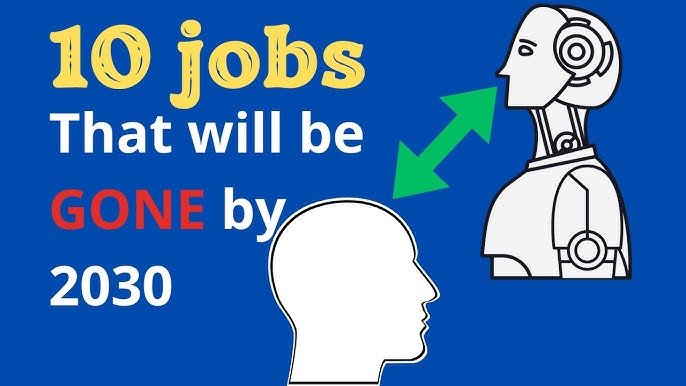
Is Your Job Future-Proof? 10 Roles That May Disappear by 2030
In a rapidly evolving digital age, the future of work is undergoing a significant transformation. Automation, artificial intelligence (AI), and changing consumer behaviors are reshaping industries, eliminating some jobs while creating new ones. As we approach 2030, many traditional roles may become obsolete, pushing professionals to rethink their career choices and future-proof their skillsets.
But which jobs are likely to disappear, and more importantly, is your job safe?
Why Some Jobs Are Vanishing
The reasons for job disappearance are multi-faceted:
-
Automation & AI: Tasks that are repetitive, rule-based, or data-heavy are increasingly being taken over by machines.
-
Changing Consumer Habits: Online shopping, remote work, and digital communication are replacing traditional business models.
-
Environmental Concerns: Sustainability efforts are phasing out environmentally harmful industries.
-
Globalization & Outsourcing: Some roles are moving offshore or being consolidated in low-cost centers.
Now, let’s look at the jobs that are most at risk.
10 Jobs That Could Disappear by 2030
1. Data Entry Clerks
With AI and machine learning software becoming highly efficient at managing, sorting, and interpreting data, the demand for manual data entry clerks is declining rapidly. Robotic Process Automation (RPA) can handle this work with more speed and accuracy.
2. Cashiers
The rise of self-checkout kiosks, online payments, and digital wallets is reducing the need for human cashiers. Retail giants like Amazon Go already operate cashier-less stores, and the trend is growing worldwide.
3. Travel Agents
While personalized services might still survive in luxury travel, most people now book flights, hotels, and experiences through platforms like MakeMyTrip, Expedia, or Airbnb. Automated booking systems, customer reviews, and price comparison tools have reduced dependency on travel agents.
4. Telemarketers
Cold calling is becoming less effective in an age of digital marketing and personalized ads. AI-powered chatbots and CRM systems are already replacing telemarketing with more efficient and less intrusive methods.
5. Postal Workers
With the decline of handwritten letters and traditional mail due to emails and instant messaging, postal services are seeing reduced workloads. Although e-commerce has kept some demand alive, automation in sorting and delivery is taking over much of the work.
6. Printing Press Operators
As the world moves towards digital content and paperless communication, the printing industry is shrinking. Newspapers, magazines, and physical books are being replaced by digital editions, making many printing roles redundant.
7. Bank Tellers
Online banking and mobile apps allow users to handle all their financial transactions without visiting a bank branch. ATMs and AI chatbots are taking over many traditional teller responsibilities.
8. Typists and Word Processors
These roles, once common in administrative setups, are fading out as most professionals are now proficient in basic word processing. Plus, voice-to-text software and AI tools are making typing skills less essential.
9. Assembly Line Workers
In manufacturing, robots and automation systems can now perform repetitive tasks with greater speed, precision, and consistency than humans. Smart factories powered by IoT and AI are minimizing human labor in assembly lines.
10. Taxi Dispatchers
Ride-sharing apps like Uber, Lyft, and Ola use algorithmic dispatch systems to connect drivers and riders in real-time. The role of a manual dispatcher has virtually vanished in cities where these platforms dominate.
Which Jobs Are Likely to Thrive?
While some roles are fading, others are thriving due to their creative, emotional, or strategic demands. Jobs that require:
-
Complex problem-solving
-
Human empathy
-
Creativity and design
-
Physical dexterity in unpredictable environments
-
Strategic thinking and decision-making
…are more likely to survive and even flourish.
Emerging roles in AI/ML, cybersecurity, green energy, digital marketing, remote healthcare, UX design, and mental health counseling are gaining momentum.
How to Future-Proof Your Career
Here are a few strategies to stay ahead of the curve:
-
Lifelong Learning: Continuously upgrade your skills through online courses, certifications, or workshops.
-
Digital Literacy: Learn to use new technologies and understand digital platforms relevant to your industry.
-
Develop Soft Skills: Communication, emotional intelligence, and adaptability are skills machines can’t replicate.
-
Networking: Build professional relationships across domains to open new career opportunities.
-
Stay Curious: Monitor industry trends, follow tech innovations, and be ready to pivot if needed.
Real-Life Example: The Shift of a Travel Agent
Rina, a 35-year-old travel agent, noticed a decline in customers due to the rise of booking platforms. Instead of resisting change, she upskilled herself in digital marketing and travel blogging. Today, she curates personalized travel itineraries for niche travelers and earns through affiliate partnerships with hotels and airlines — all while working remotely.
Final Thoughts
The future of work isn’t about machines replacing humans — it's about humans evolving with technology. Rather than fearing job loss, embrace the opportunities that come with change. Keep your skills current, be adaptable, and view automation as a partner, not a threat.
Your job might be changing — but that doesn’t mean your career has to disappear. The key is reinvention.
FAQs
Q1: Can I save my job from becoming obsolete?
Yes. By reskilling and embracing new technologies, you can shift into related or entirely new roles. For example, a cashier can train in digital POS systems or retail analytics.
Q2: What skills should I learn to stay relevant?
Focus on digital literacy, problem-solving, communication, creativity, and data analysis. Jobs that blend human intuition with tech — like UX design, digital strategy, or AI ethics — are in high demand.
Q3: Will automation affect all industries?
While automation will touch every industry to some extent, sectors like education, healthcare, creative arts, and emotional services (like counseling) are more resistant to automation due to their human-centric nature.



